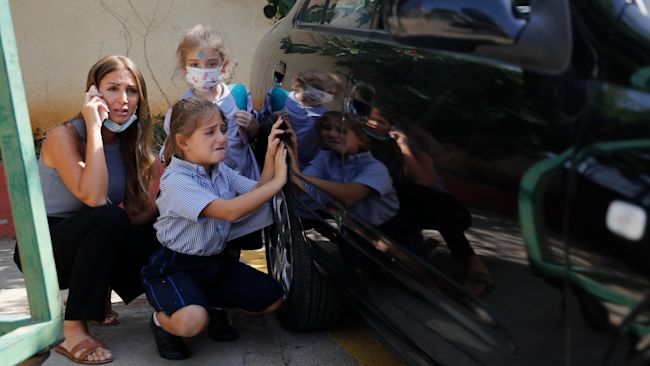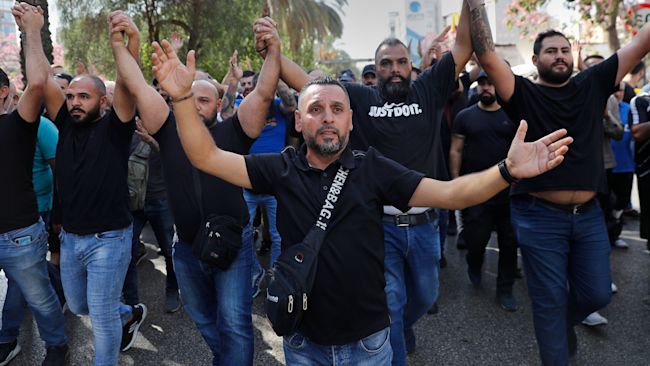
A Lebanese mother with her children hide behind a car from sniper fire outside a school, in the Christian neighborhood of Ain el-Remaneh.Credit: AP

Supporters of the Shiite Hezbollah and Amal groups chant slogans against Judge Tarek Bitar.Credit: AP
by itv.com — At least six people have been killed and dozens more injured by gunfire in the Lebanese capital, Beirut. The deaths occurred as armed clashes broke out during a protest demanding an end to a judicial investigation into last year’s massive blast in the city’s port. The demonstration was led by the Shia Muslim groups Hezbollah and Amal, who protested outside the Justice Palace to demand the removal of Judge Tarek Bitar. Lebanon’s interior minister, Bassam Mawlawi, said many of those injured were shot by snipers from buildings. He described the events as “a very dangerous sign”. The protest also saw exchanges of fire involving, pistols, rifles and rocket-propelled grenades. Amid the chaos, four projectiles fell near a private French school, causing panic, a security official said. The students huddled in the central corridors with the windows open to avoid major impact.

by npr.org — It was not clear who started the shooting, which began shortly after the start of the protest organized by the Iran-backed Hezbollah and its Shiite allies from the Amal Movement against Judge Tarek Bitar, who is leading the investigation into last year’s massive port explosion. Hezbollah and its allies accuse the judge of singling out politicians for questioning, most of them allied with Hezbollah. Tensions over the port blast have contributed to Lebanon’s many troubles, including a currency collapse, hyperinflation, soaring poverty and an energy crisis leading to extended electricity blackouts. Officials from both Shiite parties, including Hezbollah leader Hassan Nasrallah, had attacked Bitar for days, accusing him of politicizing the investigation by charging and summoning some officials and not others. They want him removed. None of Hezbollah’s officials have so far been charged in the 14-month investigation.
The probe centers on hundreds of tons of ammonium nitrate that were improperly stored at a port warehouse that detonated on Aug. 4, 2020. The blast killed at least 215 people, injured thousands and destroyed parts of nearby neighborhoods. It was one of the largest non-nuclear explosions in history and further devastated the country already beset with political divisions and financial woes. Bitar is the second judge to lead the complicated investigation. His predecessor was removed following legal challenges.
On Thursday, shortly before the planned protest, an appeals court turned down a request to remove Bitar from his post filed by two lawmakers who are defendants in the case, both of them allies of Hezbollah. The calls for the judge’s removal upset many who considered it blatant interference in the work of the judiciary. The right-wing Christian Lebanese Forces mobilized supporters Wednesday evening after Hezbollah and Amal called for the protest at the Justice Palace, located on the former front line separating predominantly Muslim and Christian areas of Beirut. Videos circulating on social media Wednesday night showed supporters of the Christian Lebanese Forces marching in the streets, carrying large crosses. In a statement Thursday, the two Shiite groups said their protesters came under fire from snipers deployed over rooftops. The army also said protesters came under fire, but later in the evening said an “altercation and exchange of fire” occurred as the protesters were headed to the Justice Palace.
The violence unfolded while U.S. Undersecretary of State for Political Affairs Victoria Nuland was in town, meeting with Lebanese officials. Her schedule was slightly thrown off by the action on the streets. Nuland later told an airport news conference that an impartial judiciary is the guarantor of all rights, in apparent criticism of Hezbollah. “The Lebanese people deserve no less, and the victims and the families of those lost in the port blast deserve no less,” she said. “Today’s unacceptable violence makes clear what the stakes are.” As the clashes erupted, an Associated Press journalist saw a man open fire with a pistol and gunmen shooting in the direction of protesters from a balcony. Several men fell immediately and bled on the street. The army sent patrols to the area following the gunfire between the Muslim and Christian sides of the capital. The Lebanese Red Cross said at least 30 people were wounded. One of the dead, a mother of five, was shot in the head.
Four projectiles fell near a private French school, Freres of Furn el Chebbak, causing panic. In scenes reminiscent of the civil war, students huddled in the central corridors. Smoke covered the neighborhoods that saw relentless gunfire. The shooting subsided around four hours later, after army troops were deployed. Youssef Diab, a journalist who specializes in court affairs, said the protest was meant as a show of force and a message that Hezbollah and Amal control the street. What happened showed them that they are not the only ones who control the street. “There is another street, and confronting it could blow up the situation in a big way,” Diab said. In a statement, Prime Minister Najib Mikati appealed for calm and urged people “not to be dragged into civil strife.” Beirut resident Haneen Chemaly, who heads a local group that provides social services, hid with her 6-month-old baby in her building’s shelter and then at her neighbors’ home. She accused Lebanon’s leaders of steering the country into civil war, saying it’s “the last card they have to use.” “They have (driven) us into bankruptcy, devastation and now they are scaring us with the specter of civil war,” she said.
Michel Younan, a resident of Ain el-Remeneh neighborhood, inspected his car, which had its windows and doors broken in the fighting. “There were protests and then suddenly gunfire began … Shooting, RPGs, everything,” he said. “Isn’t this a shame? They brought us back to the days of the war.” The clashes could derail Mikati’s month-old government even before it begins tackling Lebanon’s economic meltdown. A cabinet meeting was canceled Wednesday after Hezbollah demanded urgent government action against the judge. One Hezbollah-allied minister said he and other Shiite cabinet members would stage a walkout if Bitar isn’t removed, further complicating Mikati’s mission.
——————————————————————————–
Huge tension surrounds the probe into the port explosion in August 2020, which was caused by up to 2,750 tonnes of weapons-grade ammonium nitrate igniting after a fire. Senior officials were aware of the material’s existence and the risk it presented but failed to remove or destroy it. Swathes of Beirut were destroyed by the catastrophic blast which killed 219 people. Residents reported feeling the impact from miles away from the epicentre. No-one has yet been held accountable for the disaster.
How the Beirut blast has changed the people of Lebanon
Mr Bitar, the second judge to lead the investigation into the explosion, has faced opposition from Lebanon’s powerful Hezbollah group and its allies who accuse him of bias. While the victims’ families support his work, the militant group have said the judge is singling out politicians for questioning – most of them allied with Hezbollah. Earlier on Thursday, a court threw out a second attempt to remove Mr Bitar, whose investigation is considered by many to be a make-or-break event for the bankrupt state crippled by financial woes and political divisions.
Hezbollah and Amal have reportedly accused a staunch opponent, the Christian Lebanese Forces party, of being behind the attack on the protesters – a claim that has been denied. It was not immediately clear what triggered the gunfire earlier on Thursday, but tensions were high along a former civil war front line between Muslim Shiite and Christian areas. In a statement, Prime Minister Najib Mikati appealed for calm and urged people “not to be dragged into civil strife”. A cabinet meeting was cancelled on Wednesday after Hezbollah demanded urgent government action against the judge. One Hezbollah-allied minister said he and other cabinet members would stage a walkout if Judge Tarek Bitar was not removed.



